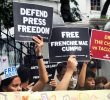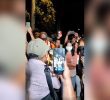By Rep. Ariel B. Casilao
(Privilege speech delivered by Anakpawis Partylist Representative Ariel Casilao at the House of Representatives on August 1, 2016)
Honorable Speaker, fellow lawmakers, good afternoon!
I was supposed to deliver this speech last week, a few days after the first SONA of President Duterte, especially, when delegates of the Manilakbayan from Mindanao were present at the gallery. I was not able to do so, as House leaders motioned for an adjournment, hence, my delivery today.
This representation from the Anakpawis Party-list would like to take this opportunity to formally send our greetings to President Rodrigo Duterte who recently delivered his first State of the Nation Address. I would also like to commend the Honorable Speaker Alvarez, the House leadership, the various staff and employees of the House of Representatives for successfully hosting last Monday’s simple, non-lavish but meaningful and even historic SONA.
I reserve my highest salute however to our countrymen who mobilized across the country for the President’s SONA, especially the three-thousand-strong Lumad and farmers contingent from Mindanao who joined the week-long caravan to Manila and participated in the giant mobilization along Batasan Road in support of the progressive policies promised by the new president
Mr. Speaker, my speech today revolves around the issue of the resumption of the peace talks between the National Democratic Front of the Philippines and the government. We, in Anakpawis, have long been pushing for this, even during the past administrations, especially as we anticipate in these talks the deliberation of matters pertaining to social economic reforms crucial in solving the root causes of the armed conflict in the country.
Mr. Speaker, mga kapwa ko mambabatas, ang armadong pakikibakang isinusulong ng New Peoples Army ay pangunahing bunsod ng kawalang lupa. Ayon sa Communist Party of the Philippines, ito ay isang digmang magsasaka na nagsusulong ng rebolusyong agraryo, o ang pakikibaka para maipamahagi sa mga magsasaka ang lupang matagal nang monopolisado ng mayayamang haciendero o panginoong maylupa at dayuhang agrikorporasyon.
In relation to this Mr. Speaker, mga kapwa mambabatas, umaasa akong yakap natin ang mga aral ng kasaysayan ng bansa, partikular na ito ay kalakhang binubuo ng armadong paglaban ng mamamayang Pilipino, mula pa Spanish colonialism, Philippine Revolution of 1896, Philippine-American war, Resistance against Japanese fascism, ang Huk Rebellion at mula dekada 70 hanggang sa kasalukuyan, ng NPA. I would like to stress Mr. Speaker, na sa lahat ng chapter na ito, kami ay naniniwalang nakabatay ito sa usapin ng karapatan o sino ang may kontrol sa lupa, na magpasahanggang ngayon ay hindi pa napapasakamay ng Pilipinong magsasaka. With more than four decades of armed conflict between the government and CPP-NPA, I seriously hope that it is clear among my fellow lawmakers that the root causes must be seriously addressed. At present, an effective forum is the forthcoming formal peace talks between the NDFP and the government.
As I come from Davao City, I have many times over personally witnessed how past administrations violently repressed the farmers and Lumad who have long been struggling for their rights to their land. I hope that my fellow lawmakers are informed of the Lumad situation in Mindanao, of how the Aquino regime implemented its counter-insurgency operations that led to massive militarization, extra-judicial killings, evacuation and other forms of human rights violations. Since the visit of DSWD Sec. Judy Taguiwalo last June, about 700 Lumad evacuees remain in UCCP Haran Compound in Davao City as they could not return to their communities because of militarization. On the last day of the Aquino regime, there were about 4,000 Lumad evacuees still staying in Tandag City, Surigao del Sur since the brutal killing of Alcadev school leader Emerito Samarca, Lumad leader Dionel Campos and Juvello Sinzo in September 2015.
Mr. Speaker, mga kasamahan kong mambabatas, sana ay maunawaan natin kung bakit sila nagbakwet. Ito ay dahil tinututulan nila ang mga tulad ng mining operations, plantation at iba na umaagaw sa kanilang mga ancestral lands. Tens of thousands from different Lumad communities are fighting for their rights to their ancestral land, and are being violently repressed by state agents in the process. I sincerely hope that we in Congress can join them in calling for the immediate pull-out of military units in the Lumad areas.
From July 2010 to December 2015, under the Aquino presidency, according to Karapatan human rights group, the number of victims of extra-judicial killings have reached 307; enforced disappearances , 30; torture, 215; forced evacuation, more than 105,000, harassments, nearly 200,000. Among the victims of EJK, majority or 283 have been peasants, while 144 or nearly half were from Mindanao. Mr. Speaker, fellow lawmakers, all these have been the extremely high cost of former President Aquino’s counter-insurgency program Oplan Bayanihan.
Noong January pa lamang, bago pa ang presidential campaign season, ipinangako na ni President Duterte ang resumption ng peace talks. At noong Mayo, inalok niya ng pwesto sa gubyerno ang CPP-NDFP at nangakong palalayain ang mga political prisoners. Noong Hunyo, tumungo na sa Norway ang mga kinatawan ng Pangulo sa Preliminary Talks, kung saan nagsilbing observer ang inyong lingkod para sa government side.
However, regarding the President’s lifting of his declared ceasefire last Saturday, we intend to remain on the positive outlook, of expressing our utmost support, of being hopeful of the resumption of the formal peace talks set on August 20 in Oslo, Norway.
While we urge President Duterte to fully push through with the formal talks, we would like to remind him that the AFP effected no change in carrying out its counter-insurgency operations in the countryside.
Mr. Speaker, mga kapwa mambabatas, kahit noong Enero pa lamang ay paulit-ulit nang ipinapahayag ng Presidente ang kanyang intensyon na ituloy ang peace talks, ang AFP ay nagpatuloy pa rin sa pang-aabuso nito sa mamamayan, katulad ng ginawa nito sa ilalim ng counter-insurgency program Oplan Bayanihan ng administrasyong Aquino.
Ang ilan dito, na nakaulat sa iba’t ibang media outlets at non-government organizations ay:
1. Hulyo 8 – 9; aerial bombing sa Brgy. Pichon, Caraga, Davao Oriental ng 67th IBPA, kasama ang para-military group na Mandaya Ancestral Defense Unit o MANADU, bago nito ay malawakang combat operations, hamletting, food blockade, looting; bunga nito ay mass evacuations ng mahigit isang libong mamamayan;
2. Hulyo 15; extra-judicial killing sa 1 lider-Lumad at wounding sa isa pa; sa Tugbok District, Davao City; ng mga hinihinalang myembro ng para-military group na Alamara na konektado sa 84th IBPA;
3. Hulyo 24; harassment ng mga ahente ng militar sa isang administrator ng isang Lumad school at kanyang pamilya nang pumasyal sila sa Regional Medical Center sa Tagum City, Davao Oriental;
4. Hulyo 26; torture ng mga sundalo sa isang manggagawang bukid ng abaca sa San Miguel, Catanduanes; itinali siya, pinagsisipa, itinali sa puno at nilagyan ng plastic ang kanyang ulo; kaugnay nito, ang mga magsasakang lumahok mula Catanduanes sa suportang pagkilos noong SONA ng Pangulo ay nakatanggap ng tawag na pinaghahanap sila ng mga sundalo sa kanilang barangay;
5. Hulyo 29; tinukoy ng 39th IBPA na ang 5 barangay sa Kidapawan City ay stronghold umano ng NPA, kung kaya tinatarget ito para sa Peace and Development Outreach Program o PDOP na nakabalangkas sa Oplan Bayanihan;
6. Hulyo 30, umaga, bago pa ang lifting ng ceasefire ng Pangulo; pagpatay sa isang buntis at pagsugat sa 7 pa, kasama ang 5 kabataan sa Brgy. Kawayan, San Fernando, Bukidnon; ng para-military group na New Indigenous People’s Army o NIPAR;
Mr. Speaker, mga kapwa mambabatas, habang abala ang Pangulo at ang kanyang Negotiation Panel para sa paghahanda ng formal peace talks, ang AFP ay tuluy-tuloy lamang sa pag-atake sa mga mamamayan sa kanayunan. Kahit noong mag-deklara ng ceasefire ang Pangulo, nagpatuloy lamang ang AFP sa mga operasyon nito at naging biktima pa ang mga magsasakang sumuporta sa kanya. Kaya, kung mayroon mang tutol sa kapayapaan sa bansa, lumalabas na ito ay walang iba kundi ang AFP, dahil patuloy nitong dinadahas ang mga mamamayang naninindigan lamang para sa kanilang mga karapatan.
Sa mga insidenteng ito, Mr. Speaker, karaniwan din ang involvement ng mga para-military groups tulad ng Alamara, NIPAR at MANADU. Tanyag na tanyag ang Alamara, maging ang Pangulo ay kilala sila, dahil sila ang suspek sa pagsunog sa mga cottage sa loob ng UCCP – Haran Compound na evacuation center ng mga Lumad noong Pebrero. Mismong si Pangulo na noo’y Davao City Mayor ang nag-utos ng malalim na imbestigasyon dito.
Mr. Speaker, while there is already a change in government leaders, how come there is no change in the fascist outlook of the AFP, militarization and abuses against the people continue? Worse, these para-military groups remain to wreak havoc among Lumad and farmers communities. Mr. Speaker, I personally, urge that the House of Representatives appeal to President Duterte to immediately disband these para-military groups as they are agents of, as the President has coined it, “peace of the dead.”
Kaya, in light of the taking the road to a just and lasting peace, hinihikayat ko ang aking mga kapwa mambabatas na suportahan ang mga napagkasunduan ng NDFP at gubyerno tulad ng 1992 The Hague Joint Declaration, ang 1995 Joint Agreement on Safety and Immunity Guarantees o JASIG, ang 1998 Comprehensive Agreement on Respect for Human Rights and International Humanitarian Law o CARHRIHL, at ang susunod na isasalang sa negosasyon na Socio-Economic Reforms Agenda. Sa agendang ito, mayor na usapin ang agrarian reform, nationalist industrialization, wage, at karapatan sa lupang ninuno ng mga indigenous people at iba pang socio-economic rights ng mamamayan.
Mr. Speaker, I sincerely hope that my fellow House members fully appreciate that this time, the administration can play an active and significant role in the pursuit of peace in the country, or in the words of the President himself, “peace of the living.” It is a paramount challenge thus for the House of Representatives to legislate measures that will lead the nation to the path of peace, even as the various sectors of the people especially the toiling masses continue to struggle for a just and lasting peace, peace that is based on social justice.
Lastly, Mr. Speaker, I call on my fellow House members to support every effort to release all political prisoners, including the NDFP consultants, protected by JASIG, the elderly and the sickly, which is a very important factor in fact in building a more favorable condition for the success of the peace negotiations between the NDFP and the government.
Thank you Mr. Speaker.





![[ANALYSIS] A different drug war](https://davaotoday.com/wp-content/uploads/2024/09/1000019103-110x100.png)




